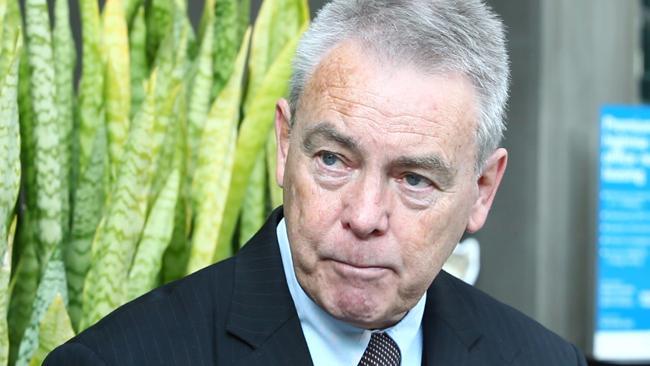Employers rejecting gen Y graduates with ‘over inflated view of their worth’
A DEGREE from a top uni? Check. Ambition? Check. Expectations of a decent salary? Check. Here’s why employers don’t actually want you.
Careers
Don't miss out on the headlines from Careers. Followed categories will be added to My News.
THEY’RE keen, qualified, and demand decent dollars, but while university graduates may seem like attractive candidates on paper, Australian employers are increasingly avoiding hiring them.
And it’s their tertiary qualifications — and delusions of grandeur — that are turning bosses off.
Accounting boss Paul Fiumara, a partner at Brisbane firm DFK Hirn Newey, is just one of them.
“There are a few problems with graduates,” he tells news.com.au. “They have this over-inflated view of their worth, they come out of university thinking they’re ready for the world, but (clients) don’t pay us the rate that they pay to get some kid who doesn’t understand what their needs are.”
He and other employers are looking at alternative recruiting grounds to fill their entry level jobs.
Although he’s frustrated by the calibre of gen Y graduates universities are offering up, Mr Fiumara isn’t blaming them. Instead he blames the bloated institutions pumping them out. That’s why he’s stopped hiring graduates altogether, instead picking ‘cadets’ out of high school.
IT’S NOT BOUNCING BACK
This not particularly inspiring news for Australian university students, all 985,000 of them.
Our universities are filled with more professional hopefuls than ever before but employers have never been less interested in them.
Graduate employment is the lowest it’s been since the 1992-93 recession. The latest Graduate Careers Australia survey shows only 71.3 per cent of bachelor degree graduates had found work within four months of completing their studies. The money they’re being paid is on the slide, too.
According to data presented at last week’s forum into university financing at the Australian National University, the median starting salary for new graduates under 25 is now 74 per cent of the average male salary, whereas 15 years ago, that figure stood at 84.2 per cent.
Dr Noel Edge, executive director at GCA says the graduate employment numbers, which account for 60 per cent of last year’s graduates or 113,00 students, aren’t improving.
“The reduction we’ve noticed in employment levels happened in 2008-09 with the global financial crisis,” he tells news.com.au.
“Unlike in previous times where we’ve had that graduate employment bounce back, we’re seeing it plateauing.
“We’re left to ponder the question of why that might be.”
While the figures reflect economic restructuring and “general uncertainty” across business, Dr Edge says they offer little insight as to why.

‘THEY THINK THEY CAN FUNCTION, BUT IT’S A DIFFERENT WORLD’
To employers like Mr Fiumara, the reasons are clear.
“I think it’s a failure of the system that universities are just pushing people out without having some practical experience along the way,” he says.
Like other employers, he’s noticed graduates emerge from their tertiary studies with “no skills to work at all”.
That’s why his firm has started a cadet program employing and training top accounting students straight out of high schools, keeping them on while they complete their accounting degree.
He says it works for both the firm and their trainees, who come out of the program more marketable than their peers who have worked in unrelated fields (like hospitality or retail) or not at all they complete their university course.
Mr Fiumara pays his cadets a clerical rate and gives them a remuneration review every six months. He says by the time they finish their university course, they’ll be rightly earning around $10,000 more than a grad with no real-world experience. The median starting salary for bachelor graduates under 25 in the field of accounting is $50,000.
“With a cadet program, they develop quickly so by the time they graduate they’ve matured a lot more, they’re better placed to get a higher position, which is where a lot of graduates expect to start without having the experience,” he says.
“Students often come out of their university time having done presentations and various things that make them think they can function in the workforce, but it’s quite a different world. What you think you’re doing in universities [is not] what you find in practice.
“Obviously while we’re training a first-year university student they’re cheaper than a graduate, so it just makes sense for us as a business, too.”
Though programs like DFK’s run parallel to a university course, some employers are ditching qualification expectations altogether.

DO YOU REALLY NEED THAT UNI DEGREE?
Jenny Lambert is the director of employment, education and training at the Australian Chamber of Commerce and Industry.
She says in sectors like hospitality, management, and humanities, the best thing prospective professionals can do is not necessarily enrol in a prestigious course, but look at the market and consider alternative pathways.
“Students really need to keep informed, and part of that is making sure they’re not pricing themselves out of being employable,” she tells news.com.au.
“There is certainly a pressure from schools. You only have to look at some schools’ marketing materials for them to highlight how many of their students go on to university. They make a big song and dance about that and we should be pleased overall, the Australian economy is better off with a higher-educated workforce, but vocational pathways should also be considered.”
Last month’s Household Income and Labour Dynamics Australia (HILDA) survey revealed students from the “Group of Eight” — the or most prestigious universities in Australia — didn’t enjoy higher incomes than those from other institutions, Fairfax reported.
A few years ago the Grattan Institute’s Andrew Norton suggested the median income for arts graduates was comparable to those holding a vocational Certificate III/IV.
“University is not for everyone,” Ms Lambert says.
The industrial body has had concerns for a long time that the labour market would struggle to absorb the high number of graduates being pumped out of our higher education systems, and, Ms Lambert says, it’s starting to show. She says she’s seen people come out of degree courses thinking they’ll go straight into senior positions, but then find they’re not ready and the feedback from businesses says as much.

HOW DO WE FIX IT?
Some employers say it’s a generational thing, which won’t be news to Gen Ys used to being slammed and recently labelled the unprepared generation. Others blame the university system, or the schools that encourage them to get there.
While it’s clear that market forces and economic restructuring are affecting the demand for new graduates, the ACCI says it’s up to universities, young wannabe professionals, and industries to each do their part to produce valuable employees.
Last month the group’s chief executive, Kate Carnell, spoke to news.com.au about universities “disconnected with the workforce”, while University of Melbourne Youth Research Centre director Professor Johanna Wyn said it was unfair to put expect universities to “be all things to all people”.
“It would be fabulous if young people were gaining really strong skills that they should be learning, but it’s really hard for educators to catch up. Instead of turning it around and blaming schools, we should look at other pathways.
Ms Lambert said universities like RMIT in Melbourne are leading the way in pushing for vocational learning and encouraging internships.
At his inner city accounting firm, Mr Fiumara believes he’s found at least a possible solution, or step on the right path for businesses working together with the education system, working together with kids.
He’s also advocated for apprentice-style training, or compulsory work placements as in medical degrees to be enforced across more industries.
But in the end, he says, it comes down to the work ethic of the individual.
“You can get great workers and not so great workers from all over the place,” he says.
“Whether it’s a generational thing or not, sometimes there’s a bit of luck and good management involved too.”
Originally published as Employers rejecting gen Y graduates with ‘over inflated view of their worth’



